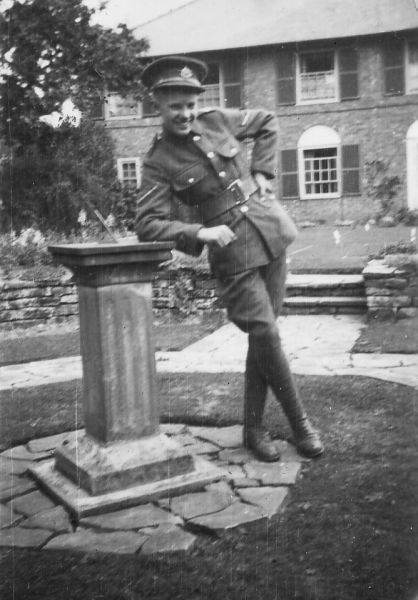Corbett, Ernest Humphries
- Date of birth:
- April 10th, 1921 (Wolverhampton/England, Great Britain)
- Date of death:
- November 11th, 1942
- Nationality:
- British
Biography
Service number 1312943, Royal Air Force Volunteer Reserve.
Ernest Humphries Corbett was the son of Mr. and Mrs. Rowland George Corbett from Wolverhampton. After his education he started working at the Boulton-Paul facotry in Wolverhampton. In 1941 he enlisted with the RAF and was send for training to Miami, Florida. After his training he was placed as Observer/Navigator with No. 61 Squadron at RAF Syerston in Nottinghamshire.
Was killed during his second mission on 11th November 1942 when the plane he at that momend was serving as observer on, Lancaster W4244, crashed near Devon when returning form a bombardment sortie.
Ernest Corbett is being remembered at the Tettenhall Regis (St. Michael) Churchyard, Staffordshire, United Kingdom.
Do you have more information about this person? Inform us!
- Period:
- Second World War (1939-1945)
- Rank:
- Sergeant
- Unit:
- No. 61 Squadron, Royal Air Force
- Awarded on:
- October 20th, 1942
"These airmen were members of the crew of a heavy bomber detailed for an operational mission one night in September, 1942. Flight Sergeant
Campbell was captain and first pilot. The allotted task was completed successfully but, whilst on the return flight, the aircraft was hit by anti-aircraft fire. A shell exploded in the bomb compartment, starting a large fire and setting some flares and distress signals alight. Simultaneously, another shell burst in the nose of the aircraft, shattering the perspex as well as the major portion of the perspex of the pilot's cupola. The resultant rush of -air through the aperture swept away all the navigational charts and maps and flung Sergeants Gunnell and Bunclark backwards on to the floor of the aircraft. Both suffered facial burns as did
the pilot, the navigator, the wireless operator and the mid-upper gunner. The aircraft became full of smoke and it was attacked by 2 enemy fighters. The pilot could not see his instruments and the aircraft went out of control and fell 2,000 feet before Flight Sergeant Campbell regained control and evaded further attacks by diving and reaching cloud cover. Meanwhile the flames in the fuselage had extended, causing ammunition to explode in all directions. Despite this, Sergeants Corbett, Bunclark and Smith fought their way through the flames to the rear turret to extricate Sergeant Thompson who, despite suffering from a broken leg and being unable to operate his guns, nad greatly assisted his captain by reporting the position of the attacking aircraft. Sergeant Coakley, in spite of his injuries, and with amazing skill in the circumstances, established wireless contact with base and continued to obtain bearings throughout the homeward flight. When this country was reached, Flight Sergeant Campbell, who had displayed fine captaincy, resumed the controls and landed the damaged aircraft safely with the undercarriage retracted and without the aid of flaps. Throughout this perilous flight, this gallant crew displayed conduct in keeping with the highest traditions of the Royal Air Force."
He was awarded the DFM along with all 7 of his fellow crew members for acts of outstanding bravery while serving on Lancaster R5724. Six members of the crew also received the DFM.
Sources
- Photo 1: Michael Vaughan
- - Second Supplement to The London Gazette of 16th October 1942, Issue 35750, dated 20th October 1942
- Commonwealth Wargraves Commission
- Wolverhampton War Memorials
- 61 Squadron - RAF Syerston



